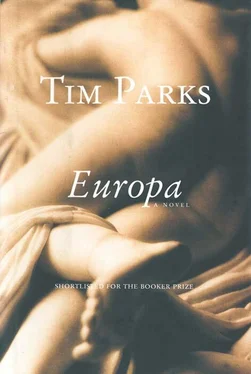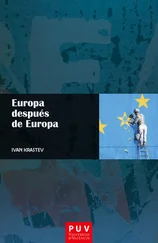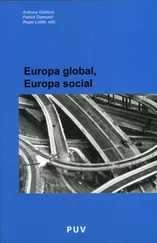Tim Parks - Europa
Здесь есть возможность читать онлайн «Tim Parks - Europa» весь текст электронной книги совершенно бесплатно (целиком полную версию без сокращений). В некоторых случаях можно слушать аудио, скачать через торрент в формате fb2 и присутствует краткое содержание. Год выпуска: 1999, Издательство: Arcade Publishing, Жанр: Современная проза, на английском языке. Описание произведения, (предисловие) а так же отзывы посетителей доступны на портале библиотеки ЛибКат.
- Название:Europa
- Автор:
- Издательство:Arcade Publishing
- Жанр:
- Год:1999
- ISBN:нет данных
- Рейтинг книги:3 / 5. Голосов: 1
-
Избранное:Добавить в избранное
- Отзывы:
-
Ваша оценка:
- 60
- 1
- 2
- 3
- 4
- 5
Europa: краткое содержание, описание и аннотация
Предлагаем к чтению аннотацию, описание, краткое содержание или предисловие (зависит от того, что написал сам автор книги «Europa»). Если вы не нашли необходимую информацию о книге — напишите в комментариях, мы постараемся отыскать её.
Europa — читать онлайн бесплатно полную книгу (весь текст) целиком
Ниже представлен текст книги, разбитый по страницам. Система сохранения места последней прочитанной страницы, позволяет с удобством читать онлайн бесплатно книгу «Europa», без необходимости каждый раз заново искать на чём Вы остановились. Поставьте закладку, и сможете в любой момент перейти на страницу, на которой закончили чтение.
Интервал:
Закладка:
Still choking with wine over the stube tisch , I escaped Plottie’s strong hand to recover in the lavatory. And it was here, relieving myself before returning, that my eyes unerringly picked out one of a score of graffiti above the urinal I had chosen, or that had chosen me: Elene , someone had scribbled — amour fugitif di quelques minutes, dont je me souviendrai pour toute la pve! My immediate response to this, splashing on to Ideal Standard in the semi-basement lavatory of a German restaurant on dubiously French territory, was to laugh, to laugh out loud, too loud, to tell myself, in the words of the man who went mad at forty-five, that There are no facts, but only interpretations . This biro scribble between smutty porcelain and barred window giving on to a courtyard of bins and sodden boxes has no more to do with you, I told myself, than the number 45 printed on a plastic oval and sunk into the synthetic plush of a luxury coach seat. Freud was right, I thought, to laugh at those who feared conspiracy in the contingent world. And if he suffered from the same problem himself and feared he might die at sixty-two because of the number’s frequent appearance right around his sixty-second birthday, then he had all the more reason for laughing at it, for laughing at himself. You can never go wrong when you laugh at yourself , I thought, and I told myself that what I must do was to take control of my mental processes, to repossess myself, as Freud no doubt had repossessed himself, I must stop functioning as a Black Hole dragging down all around me into a solipsistic world of unbearable density. No facts, I told myself, re-reading that graffito, only interpretations.
But how little philosophy helps! Tucking my cock in my pants, I was reminded for some unfathomable reason of the Eleusinian mysteries. My special study it was to be, at last light thrown on that most obscure of Athenian traditions, the twelve-mile dance down the Sacred Way to Eleusis, the group hysteria under pure light of midsummer: sex, ecstasy, possession. I read everything I could find about the subject and discussed it at length with her in Pensione Porta Genova, and once I remember her hugging me tight and gesturing to the room and saying this was our Sacred Way, these embraces our Mysteries, she had tears in her eyes, but I never mentioned to her then what now seems the only sensible comment I ever found on the subject, or rather somebody else did, because it was quoted in the kind of scholarly work I once dreamed of writing myself. What were the mysteries, asks Aristophanes? The saying of many ridiculous and many serious things. Eléne, amour fugitif . Thank God her name was not Eléne.
How infantile! I sink back on my bed. But will there come a moment, I ask myself, when your disgust now will seem as infantile as your vanity then? Will there? One can only hope so. One can only hope that self-loathing will one day seem as foolish as self-esteem. Certainly there will never be a point of rest, I tell myself, never an equilibrio interiore , the mind anchored to a world of pure form or in reposeful contemplation of the Dantesque divine. Not even if forty-five does prove fatal I remember stopping in amazement once at those lines in Chateaubriand when he talks about the dusty thoughts of the dead, when he asks, musing in some revolutionary cemetery: Who knows the passions, the pleasures, the embraces of these dry bones? More than once it has occurred to me that there is already something posthumous about my present existence.
Returning to my meal from Hommes et Eléne , it was to find my colleagues in the middle of an amicable show of hands. While I peed and philosophized, Vikram Griffiths had already been voted out. His minority culture credentials, his friendship for animals, his generosity with other people’s money, his considerable charm, had not been enough. And it occurred to me, as I sat down at the stube tisch , how appropriate it was of my colleagues not to have waited for me. I had said nothing during the discussion. I had said nothing on the coach trip from hotel to town during which Barnaby Hilson, experimental novelist of middle-class Protestant Dublin family and bland good looks, had played traditional Irish tunes on his traditional Irish tin whistle and Indian Welsh Griffiths and English Colin danced an unsuitable highland fling in the aisle while I was forced by powers beyond me to analyse every back and forth of the ill-judged telephone conversation with my daughter. So much for your decision to be extrovert, I told myself. So much, I thought, returning to my seat from the lavatory, for all your decisions. Then sitting down I was just in time to cast the vote that deprived Dimitra of a majority. I raised my hand as the count was being taken and I thought, apropos of absolutely nothing: Dimitra is the spy . Dimitra announced the shock-horror of’ Professor Ermani’s having a list of those who had voted for the trip to Europe precisely because, having given him the list herself and having agreed to keep him informed, as a matter of courtesy (after all she had voted against the trip), she felt it wise to invent the spy story so that nobody would ever imagine it could be her, Dimitra, who had told Ermani what everybody would be surprised he knew, assuming that knowledge should ever come out. And at once I felt fascinated, appalled, by how devious people can be; then, reflecting that I had no grounds for believing what I had just supposed, I felt even more appalled by how devious I could imagine people being. As if in a world where nothing can be said (to my daughter for example), where the truth can only bring offence (to my wife for example), there were nothing for people to do but be endlessly, infinitely devious, though always behind a smoke-screen of the noblest values. So you betrayed your wife for years, I thought, telling yourself all the while that it was precisely the outlet this betrayal afforded, the pleasure and emotional release you derived from it, which would allow you to keep the family together , telling yourself, ludicrously, that betrayal was a form of faithfulness , as if love, obsession, whatever, were things that could be managed and manipulated and made to serve an overall strategy rather than simply things that happen to you and that you will never never understand, like being born or dying.
I sat down, somewhat flushed still with the wine and my choking fit and my inflammatory memories, to find, on the table before me, pork and dumplings abandoned in a stagnant pool of thin broth, and immediately, without mental mediation, I cast the vote that tipped the balance five to four against Dimitra, the spy, whose fiercely powdered glare upon my raising my arm cheered me up, galvanized me, to the point where I was actually paying attention. And the person I paid attention to, of course, was her . Because this must be the moment, I thought, that she had been waiting for. Unfrocking Griffiths, I thought, with all he had drunk and the way he was behaving, winking at all the girls and putting arms round shoulders and talking about going on the razzle afterwards, trying to translate the notion of razzle for those who didn’t understand, and using the sleeve of his tatty blue sweater to wipe the dumpling soup from his chin, had not, for all his apparent political astuteness, been too difficult. And the students understood in the end, despite their groans, despite their no doubt vraie sympathie for someone who not only was not quite white but was giving them a cheap meal into the bargain. They’ were all from wholesome middle-class families in the end. They understood that Vikram Griffiths’ kind of revolutionary behaviour would not impress a major international institution of the variety they themselves would one day like to work for. Why else were they studying for a degree in languages if not to work one day for a major international institution? So it is, I thought, sitting down at the table to discover from Plottie that Vikram Griffiths had already been voted out, six to two, in my absence, so it is that while one’s sympathies lie in one direction one ends up choosing another, or accepting another, out of a sense of realism, by which of course we mean a sense of fear, a sense of obedience to laws we imagine greater than ourselves. As for example morality, or society, or history. So it is, I told myself, forking a dumpling into my mouth, that one stomachs more or less any mess one’s nose is pushed into, in the name of history and common-sense and realism, until the day comes when something inside simply compels us to behave in the least realistic manner imaginable, compels us to fly in the face of all prudence, as when I said on that same narrow bed in Pensione Porta Genova: I want to leave my wife for you , or later still when, quite gratuitously, after years of caution and realism, but definitely operating under the strongest of compulsions, I told my wife everything that had happened and destroyed her world for her.
Читать дальшеИнтервал:
Закладка:
Похожие книги на «Europa»
Представляем Вашему вниманию похожие книги на «Europa» списком для выбора. Мы отобрали схожую по названию и смыслу литературу в надежде предоставить читателям больше вариантов отыскать новые, интересные, ещё непрочитанные произведения.
Обсуждение, отзывы о книге «Europa» и просто собственные мнения читателей. Оставьте ваши комментарии, напишите, что Вы думаете о произведении, его смысле или главных героях. Укажите что конкретно понравилось, а что нет, и почему Вы так считаете.












